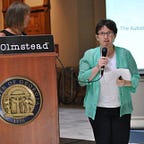Cognitive dissonance and diatribes: Apologist responses to filicide
In 2013 or 2014, I wrote a petition to garner public support for a proper sentencing of K. Stapleton along with wanting to send it to the Judge in the case (the Judge part is not how that works, but I was fresh into my advocacy, all things considering). She tried to murder her autistic daughter, Issy Stapleton. In 2015, my then-ASAN chapter in Atlanta put out an action alert to remove the phrase ‘mercy killing’ from a Dawson County, GA youth named Dustin Hicks’ coverage. He was a disabled filicide victim.
The Disability Day of Mourning memorial site, by ASAN, so far goes back to 1980. And many disabled people have been fighting for this justice for far longer than I have. Officially, the Disability Day of Mourning started in 2012, and its initial organizer was honored as a White House Champion of Change for this work. Every year the list of names we read gets longer as we find more victims from years past, and as family members continue to murder disabled people in their care.
Autistic children are more likely to abused. I grew up a victim of child abuse. My abuser did not target me for my behavior. He targeted me because he wanted to hurt people, and knew if anyone found out — save for my mother — they would sympathize with him.
Zoe Gross of ASAN comments, at the 2019 DC vigil, of a recent study on abuse of autistic children: “The researcher was asked what makes autistic children vulnerable to abuse, and his first thought was: it’s the way they…
